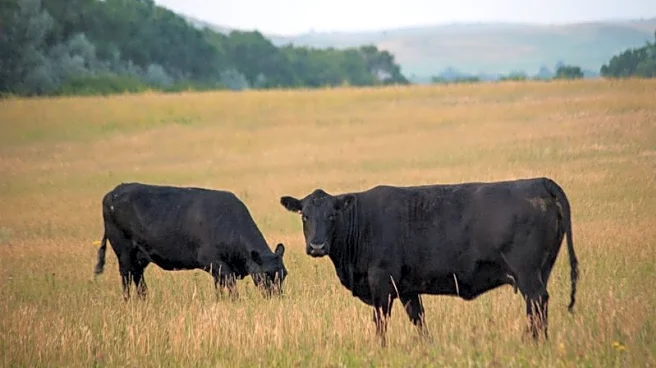By Tom Polansek
CHICAGO (Reuters) -U.S. health officials gave the Food and Drug Administration the power to quickly authorize veterinarians and farmers to treat or prevent infestations of a flesh-eating
livestock pest with animal drugs that may be approved for other purposes or available in other countries, the Department of Health and Human Services said on Tuesday.
No cases of the New World screwworm have been confirmed in the U.S. for decades. However, the Trump administration and livestock ranchers anticipate infestations that could reduce the nation's cattle herd and lift beef prices, already at record highs.
Screwworm, a parasitic fly that eats livestock and wildlife alive, can infest any warm-blooded animal.
Last month, the pest was found in Mexico about 370 miles from the U.S. border, prompting the U.S. Department of Agriculture to indefinitely halt imports of Mexican cattle.
The best method to fight screwworm is by breeding sterile flies that reduce the mating population of wild flies. However, experts say many more sterile flies would be needed beyond the current production capacity to slow screwworm's spread in Latin America.
It can take a year or more to build facilities to increase sterile fly output. Cattle ranchers may need quick access to screwworm drugs in the meantime, and there are no FDA-approved drugs for screwworm in the U.S.
The Department of Health and Human Services said it allowed the FDA to issue Emergency Use Authorizations that permit the use of animal drugs not formally approved to treat or prevent screwworm. The FDA did not immediately respond to a question about whether drugmakers have already sought emergency authorizations.
"The risk to human health in the United States remains very low, but the potential future threat to animal populations and the food supply chain requires proactive action," the FDA said.
When HHS declares that an emergency use authorization is appropriate, the FDA can allow unapproved medical products or unapproved uses of medical products to tackle serious or life-threatening diseases, if no alternatives are available. In 2020, HHS allowed the emergency use of drugs during the COVID-19 pandemic.
If screwworm is found in U.S. animals soon, an important part of the response would involve using drugs in ways that are not in line with their label directions, Tristan Colonius, chief veterinary officer for the FDA's Center for Veterinary Medicine, said during a webinar last week. This could allow veterinarians and ranchers to access products more quickly, rather than waiting for a longer FDA review process.
Colonius said the FDA was assessing literature reviews of products that were approved for other uses to determine what may be effective against screwworm. The agency also wants products with specific approvals for screwworm, he added.
The FDA has been looking at foreign markets where screwworm has been endemic to see whether drug companies will bring products to the U.S., Colonius said.
In May, cattle producers' group R-CALF USA asked the FDA to allow ranchers to feed ivermectin to livestock, as a precaution against the potential return of screwworm. The USDA has successfully used the anti-parasite drug to control the northern movement of cattle fever ticks, another pest that can be fatal to livestock, according to R-CALF.
The USDA said on Friday it would spend up to $750 million to build a facility in Texas that produces sterile flies. Agriculture Secretary Brooke Rollins did not say when the plant would open but previously said such a facility would take two to three years to build.
(Reporting by Tom Polansek; Editing by David Gregorio)









